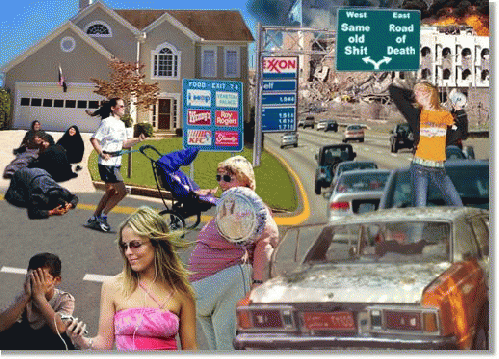Most of the men I grew up with in Alabama and Georgia deny the veracity of climate change.
They are unwilling to make the connection between their ownership (actually the bank's) of SUVs and oversized pickup trucks and the super storms, tornados and massive floods that, now with alarming regularity, ravish the region.
Because their besieged sense of self is intermeshed with their motor vehicles, they hold fast to these symbols of the fading world they know.
In their imaginings, these gruesome, noxious (and obnoxious) machines represent power and mobility -- exactly the aspects of their lives that have been diminished by the demands and degradations of oligarchic capitalism.
By their self-imprisonment in these sorts of compensatory fantasies, they choose to risk their children's future, rather than, as one victim of his own curdling testosterone put it, give up his over-sized pick-up truck "and drive a 4-wheel vagina, algore-mobile."
A deep-rooted, malignant anger regarding their diminished sense of manhood seethes at the core of pronouncements such as that, and the following, shared on my Facebook scroll, this past Earth Day:
"Happy Earhart day!!! How did you celebrate? I clubbed an adorable baby harp seal, dumped a barrel of waste oil down the storm drain, and started a giant tire fire!!! Good times"."
The sentiment expressed above is an imprecatory prayer, born of uneasy submission i.e., the callow voice of deep denial, a manifestation of a culturally re-enforced, self-protective cynicism -- a reflexive negation of novel ideas that masks a besieged psyche; it is the nihilistic rage appropriated by the powerless serving as a bulwark against the anxiety created by shifting circumstances and buffeted verities.
In the U.S., life keeps changing for the working class -- and not for the better.
Hence, an inner voice of doubt and despair falsely informs these men that the agents and effects of change will be of no help to them personally " that no one (especially smug, know-it-all liberals) can be of service to you, and, worse, what little you have amassed will be lost.
It is a common (unspoken) fear of the men I grew up around down south that if they were to let go of what little they clutch, nothing would arrive to replace what would be lost.
There will be no place reserved for them and their families in the new situations and novel arrangements that (by their addled take on the situation) elitist environmentalist snobs contrive to force upon them.
Moreover, in the corporate state, the loss of community, in combination with the commercially-rendered sameness of the environment and the all-encompassing, manic insistency of mass media -- both of which are so devoid of depth, context and meaning -- it has become increasingly difficult for an individual to gain then retain the sense of self necessary to know where one exists in relationship to time, place, and changing social and political circumstance.
How is it possible to move in the direction of propitious change when the demands and distractions of the corporate/consumer state have negated one's ability to remain still and focus long enough to even grasp the nature of the problem?
The relentless exploitation of both earthscape and timescape has had a catastrophic effect upon the inner realms of thoughts, dreams, and imaginings of the citizen/consumers of the neo-liberal economic superstate.
Loss of place and an attendant crisis of identity are inextricably bound to the angst and anomie so evident in the present neo-liberal epoch: Being bereft of connection to land, sky, sea, and polis creates a profound sense of unease.
(Note: You can view every article as one long page if you sign up as an Advocate Member, or higher).





